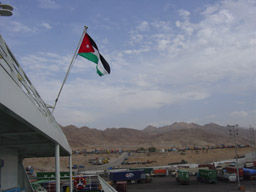
On the ferry at last
 On the ferry at last |
The ferry needs three hours to reach Nuweiba. It arrives in the darkness what we actually wanted to avoid. In the opinion of many travellers, the local Egyptian harbor authorities have an especially bad reputation. Thus it would certainly be much better to go through this chaotic control at daylight. But we have no choice. In the next two quite hectic hours we pin our hopes on a very friendly officer of the tourist police who explains us how to get through this border control. At six different places we have to pay with the Egyptian pounds that we had just exchanged into local currency to settle various matters. In all we pay almost EUR 300 for this stupid bureaucratic procedure. The peak of this robbery is the fee they charge us for copying our passports: EUR 4,00. Of course we could give them our copies of the passports, but the officials do not accept them. Probably the copy machine is one way for them to increase their salary. Sometimes this reminds us of the Indian bureaucracy that also has its roots in the colonial power of England. We both have the impression that this border clearance is the worst we had ever experienced on our trip. It is hard to believe that Egypt is said to be a civilized holiday destination.
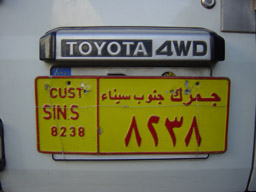 Arab license plate |
After our cruiser has been checked thoroughly and more than once by over 15 different officers, we can finally take the coastal road heading for the oasis city of Dahab. It is very late indeed and our land cruiser is the only vehicle on the road. Our destination is the diving center of Ingrid and Mohamed whom we have already visited 13 years ago in the Sinai. At this time the two had the only diving center for miles around. Meanwhile the small Bedouin village of Dahab has changed (as the Sinai in general) and now represents a small town with more than 50 diving bases. Nevertheless not too many "dreadful" new buildings were constructed and it is still a pleasant place. We relax for a few days and enjoy the magnificient underwater world before we head for Cairo to get our visa for Libya.
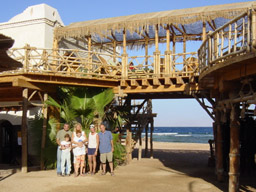 At Ingrid's and Mohamed's base |
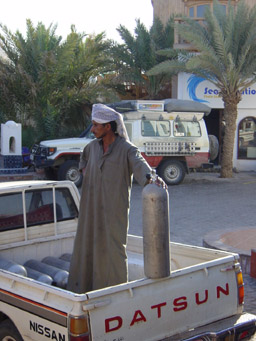 Sinai air filled into bottles |
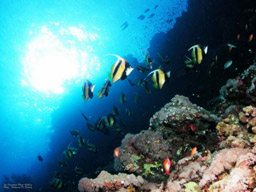 Magnificent underwater world |
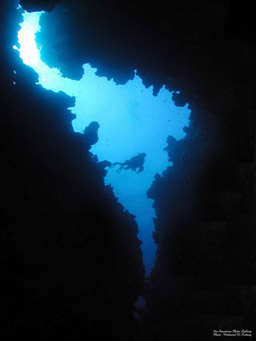 In the Canyon |
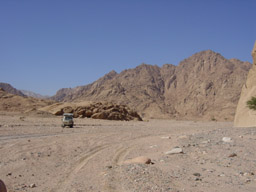 On our way to the Bedouin |
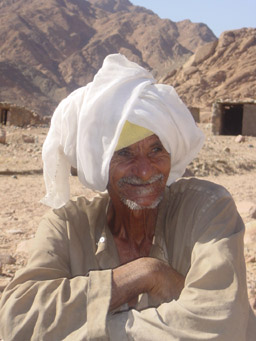 Very friendly Bedouin |
We spend a whole day driving from one place to another. It is unbelievable at how many different spots these people live in this supposedly barren land.
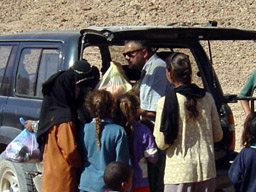 Supporting the people. |
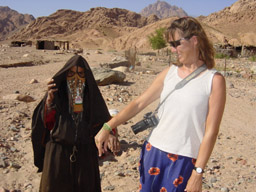 Bedouin headdress |
Later on a Bedouin shows us the magnificent Wadi Kid scenery with its unique mountain ranges and the many date palms. We really regret that we cannot stay longer and enjoy being with these nice people.
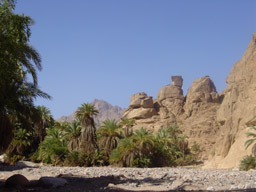 Wadi Kid |
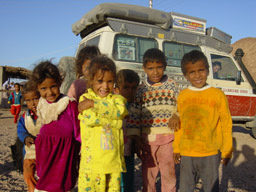 Bedouin children |
By the way: Mohamed still looks for a science teacher for the school in Dahab that he founded and supports financially. Lessons are conducted in English. Board, lodging and diving (!) are free and a standard local salary is paid.
We take a road across the Sinai to Gebel Musa (2,285 meters), in Europe rather known as Mount Moses (or Mount Horeb). In the 13th century AD Moses here heard the ten commandments on his way to the promised Land. At the foothills of this mountain the orthodox St. Katharina's Monastery was built 1400 years ago. It had never been conquered, damaged or destroyed in its long history. The Prophet Mohammed, founder of Islam, put this holy place under his personal protection by presenting his credentials. Later Arab caliphs, Turkish sultans and even Napoleon on his Egypt campaign did the same. The monastery exhibits an offshoot of the „formerly burning bush„ which is still very much alive! According to the Bible, God talked to Moses from within this burning bush and sent him to Egypt to liberate the Israeli. Then Moses led them to the promised Land.
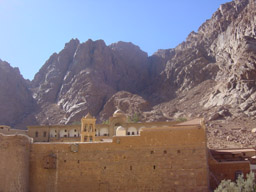 St. Katharina's Monastery |
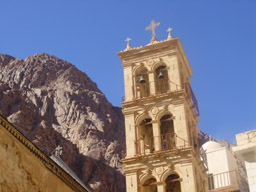 Church of the Monastery |
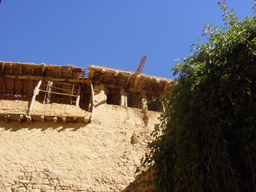 The "burning bush" |
We continue through the Wadi Feiran towards Suez. A few weeks ago heavy rain had fallen in the extremely dry Sinai region so that mud and scree cover the road at the bottom of the Wadi valley. We are lucky: The road was made passable and we are able to continue our journey. Obviously wadis are not primarily meant to be used as normal streets.
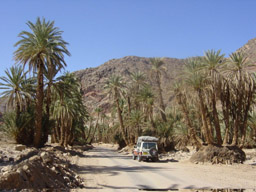 Wadi Feiran |
At the Gulf of Suez road conditions are very good. We head for Suez and drive under a canal through a tunnel onto a highway leading to Cairo. Here we finally do get our visa for Libya! We quickly take a picture in front of the pyramids before we head west to the Berber oasis Siwa at the Libyan border. A few years ago we had already spent much time admiring the Egypt's treasures at the Nile. Therefore we do not feel like missing anything when quickly continuing our tour.
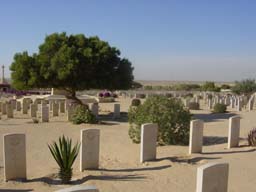 War graves |
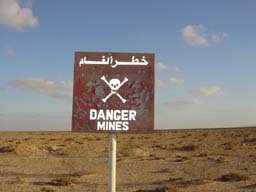 Dangerous mines |
We then traverse an uninhabited and barren desert by driving from the Mediterranean Sea 300 kilometers southwards to reach Siwa. This road wasn’t built until the '80s to connect the then isolated oasis with the outside world.
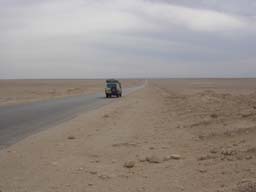 300 kmr to Siwa |
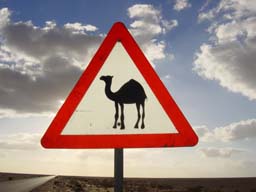 Camel‘ s crossing |
Primarily the Berber people live in Siwa. They still speak their own language and learn Arabic as a second language in school. 300,000 palms and 70,000 olive trees grow in this oasis. No one would expect so much greenery in this arid desert.
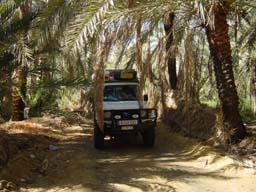 Palm oasis |
We are surprised to see 50 hot and cold fresh water springs where is it said that Cleopatra had bathed. The people here, who mainly live from their date palms and olive trees, live very primitively. Donkey carts, mud huts, and small colorful market stands characterize the village.
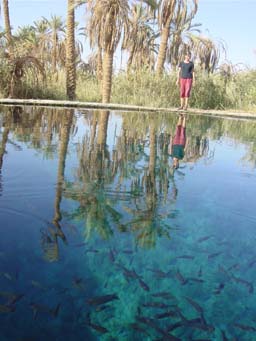 Crystal clear hot springs |
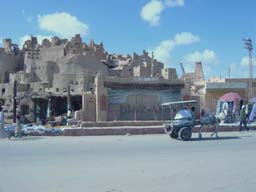 Siwa |
All around Siwa we see one of the most beautiful dune landscapes spreading over 800 kilometers up to Libya. We get a special permit from the military police allowing us to visit this sand sea for two days. Here is the probably largest and highest sand dune in the world with a length of 140 kilometers. Particularly interesting are the petrified coral reefs in the midst of the desert, since this desert is 300 kilometers away from the Mediterranean Sea!
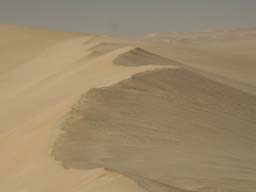 Dune landscape |
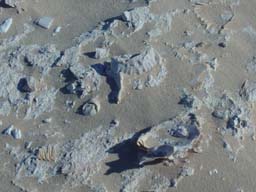 Fossilized coral reef |
Siwa and its environs alone would make going on an extra off road Egypt tour worthwhile. With heavy hearts we leave this absolutely beautiful place and head for the Libyan border being very curious and anxious to see how the border officials will treat us.
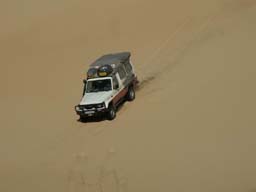 Offroad 1 |
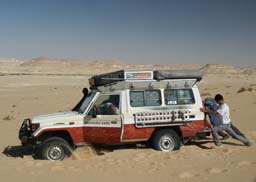 Offroad 2 |
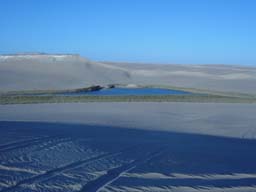 Desert Lake |